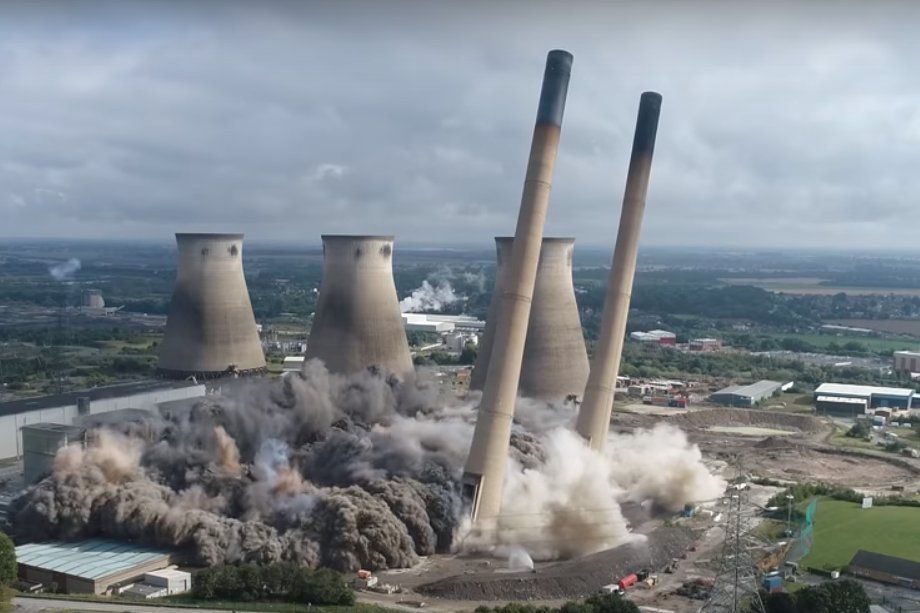Britain's self-inflicted energy disaster
News & Social Media / Post
How the establishment brought Britain to its knees

The EU’s Large Combustion Plant Directive imposed limits on sulphur dioxide. Before they were obsessed with global warming, they were obsessed with acid rain. Climate change, though, was the primary pretext given for the destruction of our coal burning electricity plants under the Directive. At the time it pointed to the need for 33GW of new generation to replace lost capacity.
The then Labour government, with Ed Miliband as energy minister, handed Ofgem the task of replacing that capacity with renewables – mostly with offshore wind power. It was widely known at the time that wind energy couldn’t possibly plug that gap. It wasn’t technically feasible and in the wake of the financial crisis, wasn’t financially feasible either. The financial environment was not conducive to incentivising investors to cough up with the £200 billion needed.
Ignoring the technical obstacles entirely, Ofgem thus focussed on financial incentives which it deems necessary to “unlock” the necessary investment, coming up with a package of measures. First amongst these is imposing a minimum carbon price (level unspecified) to “encourage investment in low carbon technologies”. This mechanism was designed to increase the costs of conventional power generation to the point where the vastly more expensive renewable energy becomes “competitive” and thereby promotes investment in it.
Totally missing was any indication of who would pay for the increased carbon price, and/or the vastly increased cost of power generation. Somehow, Ofgem believed it was a no-cost option. Its next brainchild called “Enhanced Obligations and Renewables Tenders” was a plan to increase the subsidies (although it does not call them that) to renewable energy providers, and giving them a guaranteed return.
Thus the scene was set. Investment was artificially diverted toward unreliable intermittent energy, at enormous cost to the bill payer, while neglecting baseload generation entirely. As wind capacity has increased, gas plant, which should have served as baseload became backup provision, running idle when the wind was blowing, and running full blast when it wasn’t.
It was well understood by wind sceptics at the time that this would result in local gas shortages during peak demand, requiring emergency purchases of gas on the spot market, at highly inflated prices. This was then exacerbated by David Cameron’s coalition government when the then energy minister, Ed Davey, thought better of renewing Britain’s gas storage infrastructure. The consequences of which we are now experiencing.
Having made energy from gas artificially expensive by a substantial margin, and having caused a gas drought, the wind industry is now legally able to claim that wind energy is cheaper. That, however, is an accountancy trick, being that the method they use to calculate costs ignores the whole system costs; the cost of transmission, grid balancing and the capital costs therein.
Being that the media, and politics in general has little in the way of collective memory, especially when it comes to their own errors the assertion that wind energy is cheaper often goes unchallenged, especially by the BBC whose energy and environment correspondents barely conceal their eco-activism. It is widely believed that wind is cheap and the wind is always blowing somewhere. Neither of these things are true.
The war in Ukraine among other external factors are being blamed for our current energy predicament, but the seeds of this energy emergency were sown almost over a decade ago, and successive administrations have ignored the warnings as they favoured climate virtue signalling on the world stage. The system was already precarious, having engineered a capacity gap resulting in more frequent National Grid system alerts. On a long enough timeline, a geopolitical event such as the Ukraine invasion was guaranteed to come along and push us over the brink. Our energy planning should have accounted for it.
Though this all began with an EU directive, this is very much a home grown disaster, by all of the usual suspects. This is why Brexit of itself is of very little use to us unless it also includes a draining of the swamp. Many leave voters thought that’s what they were getting by voting for Boris Johnson, but his enthusiastic adoption of Net Zero (more of the same insanity) should disabuse voters of any such notion.
It is now too late to avoid a crippling energy crunch. We could and should have set about nuclear renewal more than a decade ago, with new builds happening concurrently with old nuclear decommissioning. The fools we elect, however, informed largely by the green blob that dominates the energy sector, genuinely believed the gaps could be plugged with windmills and solar panels – and that it would be cheaper. The delay on new nuclear builds means it will cost us substantially more than it ever needed to. There is now little chance that energy prices will ever return to what we considered normal – and certainly in the next two decades. We’ve blown it.
The government’s latest energy announcement is a rehash of much of the same muddled messaging we’ve been getting for the last year or so, which is rooted in the same thinking that created this disaster to being with. Boris Johnson’s “low-carbon transition plan” is indistinguishable from Miliband’s fantasy thus prices will continue to skyrocket and our energy system will continue to deteriorate.
Worse still, the rising price of commodities and labour costs mean that much of the government’s plans will never come to fruition and new capacity will not outstrip the rate of decommissioning. Probably within the next parliamentary term the wheels will start to fall off and the government will need yet another emergency plan to keep the lights on. Being that they still won’t abandon their Net Zero delusions, we’ll be paying for two energy systems. The one our political class wants, and the one we need to keep the lights on.
This, though, is not sustainable. The British economy is already creaking, and households are having to tighten their belts like never before. The low grumblings will soon become shrieks of pain, as the entire post-war economic order collapses. That the the Tories won’t survive it is perhaps the only silver lining.
The further danger is that this leads to civil unrest and Labour inherits power by default, having done nothing to deserve it. That could then lead to a constitutional crisis, as the public withdraws their consent to be governed by Westminster.
If the Labour Party intends to use its power to install its toxic identity politics and its gender voodoo, then Britain could follow America down its path of societal disintegration. The violence and disorder in the USA was contained because the basics continued to work, but when Brits face energy rationing, power cuts, and involuntary supply termination, the fallout could make the Poll Tax riots look like a teddy bear’s picnic and the Croydon riots look like a family barbecue.
Recent National News











